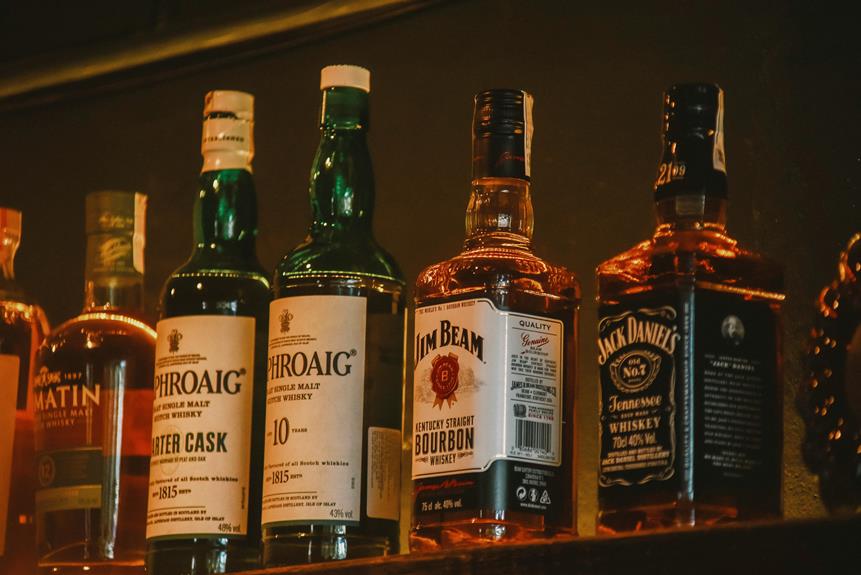
When it comes to Bourbon and American Whiskey, the distinctions go beyond mere labels. Understanding the nuances between these two spirits can unveil a world of heritage, craftsmanship, and diverse flavors that cater to varied palates. As you explore the key disparities between Bourbon and American Whiskey, you'll begin to appreciate the intricate details that shape each sip and the cultural significance that has elevated these spirits to iconic status. Get ready to embark on a flavorful journey that delves into the heart of American distillation traditions and the artistry behind these beloved spirits.
Bourbon Vs American Whiskey Origins
When exploring the origins of Bourbon and American Whiskey, it's crucial to understand the distinct historical paths each spirit has taken.
Bourbon, with its roots dating back to the late 18th century, specifically in Kentucky, is known as 'America's Native Spirit.' Its name is often attributed to Bourbon County, Kentucky, but its true origins lie in the broader American whiskey-making tradition influenced by early settlers, particularly Scots-Irish immigrants.
On the other hand, American Whiskey encompasses a broader category that includes various styles like Tennessee whiskey and rye whiskey. The history of American Whiskey traces back to the colonial period when Scottish and Irish immigrants brought their distilling traditions to the new world. Over time, these traditions evolved, leading to the diverse range of American whiskeys we see today.
Understanding the distinct historical backgrounds of Bourbon and American Whiskey sheds light on the unique characteristics and flavors that define each spirit.
Production Process Variances
Exploring the production process variances between Bourbon and American Whiskey reveals significant differences in their distillation methods and maturation techniques. Bourbon, by law, must be made from a mash containing at least 51% corn and aged in new charred oak barrels. The distillation process involves using column stills, which produce a lighter and smoother spirit.
On the other hand, American Whiskey encompasses various styles like Tennessee Whiskey and rye whiskey. Tennessee Whiskey, similar to Bourbon, follows strict guidelines and undergoes charcoal filtering before aging. Rye whiskey, a type of American Whiskey, must contain at least 51% rye in its mash bill.
The maturation process for American Whiskey often involves aging in used barrels, allowing for more interaction with the wood and imparting different flavor profiles. Understanding these production nuances is crucial in discerning the distinct characteristics that set Bourbon and American Whiskey apart.
Flavor Profiles Distinctions
Delving into the flavor profiles of Bourbon and American Whiskey reveals distinctive nuances that stem from their unique production processes. Bourbon, known for its rich and sweet flavor profile, often carries notes of caramel, vanilla, oak, and sometimes a hint of cinnamon or nutmeg. The charred oak barrels used in Bourbon production contribute to its deep, smoky undertones and smooth finish.
On the other hand, American Whiskey encompasses a broader category, offering diverse flavor profiles. American Whiskeys can range from light and floral to bold and spicy, with variations in taste influenced by factors such as the grains used, aging process, and distillation techniques. Rye Whiskey, a type of American Whiskey, tends to have a spicier flavor profile with notes of pepper and fruit.
Tennessee Whiskey, like Bourbon, also undergoes the Lincoln County Process, which involves charcoal filtering, resulting in a slightly different flavor profile compared to traditional Bourbons. Exploring the flavor distinctions between Bourbon and American Whiskey can lead to a deeper appreciation of their unique characteristics and complexities.
Cultural Significance Comparison
Comparing the cultural significance of Bourbon and American Whiskey reveals intriguing insights into the societal impact of these beloved spirits. Bourbon holds a special place in American history, with its roots tracing back to the 18th century in Kentucky. It has become intertwined with American culture, symbolizing tradition, craftsmanship, and even rebellion. The production of Bourbon is governed by strict regulations that dictate its ingredients, distillation process, and aging in new charred oak barrels. This adherence to tradition and quality has elevated Bourbon to an iconic status in American society.
On the other hand, American Whiskey encompasses a broader category that includes various styles like Tennessee whiskey and rye whiskey. While not as steeped in tradition as Bourbon, American Whiskey still plays a significant role in American culture. It's often associated with relaxation, camaraderie, and celebration. The diverse range of American Whiskeys allows for different expressions of creativity and innovation within the spirits industry, reflecting the dynamic nature of American society. Both Bourbon and American Whiskey continue to shape social gatherings, traditions, and even economic activities, showcasing their enduring cultural significance.




